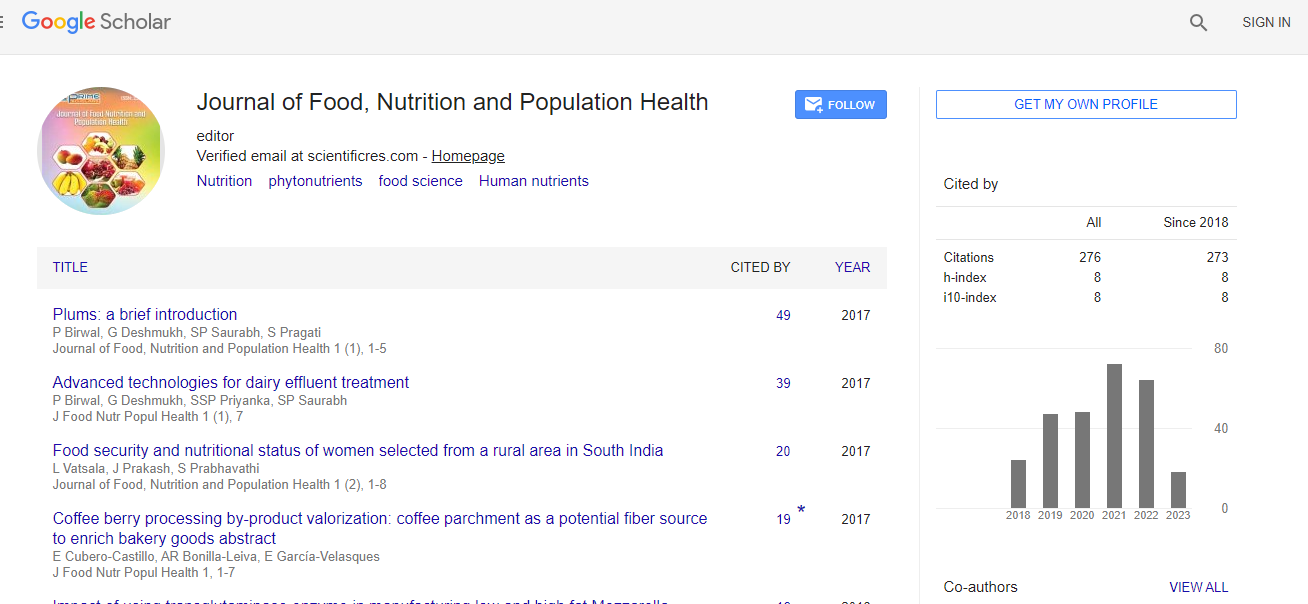Commentary - (2024) Volume 8, Issue 1
Exploring the Fascinating World of Food Sciences: Enhancing Nutrition, Safety, and Sustainability
Lucia Alvaro*
Department of Human Health Trinity, Western University, Canada
*Correspondence:
Lucia Alvaro,
Department of Human Health Trinity, Western University,
Canada,
Email:
Received: 28-Feb-2024, Manuscript No. PJFNPH-24-19936;
Editor assigned: 01-Mar-2024, Pre QC No. IPJFNPH-24-19936 (PQ);
Reviewed: 15-Mar-2024, QC No. PJFNPH-24-19936;
Revised: 20-Mar-2024, Manuscript No. PJFNPH-24-19936 (R);
Published:
27-Mar-2024, DOI: 10.21767/2577-0586.8.01.07
Description
Food science is a multidisciplinary field that encompasses
various scientific disciplines to understand the composition,
properties, and behavior of food. It plays a crucial role in ensuring
the safety, quality, and nutritional value of food products
while also addressing global challenges such as food security,
sustainability, and public health. This paper delves into the diverse
facets of food sciences, highlighting its contributions to
enhancing nutrition, safety, and sustainability in the food supply
chain. Nutritional sciences form a significant component
of food science, focusing on the composition, bioavailability,
and physiological effects of nutrients in food. Researchers in
nutritional sciences study the impact of dietary patterns on
health outcomes, develop dietary guidelines, and explore
strategies to address malnutrition, obesity, and diet-related
diseases. By understanding the complex interactions between
diet and health, nutritional scientists play a vital role in promoting
optimal nutrition and well-being across populations. Food
chemistry and biochemistry involve the study of the chemical
composition, structure, and properties of food components,
including proteins, carbohydrates, lipids, vitamins, minerals,
and additives. Researchers in this field investigate food processing
techniques, flavor development, shelf-life extension,
and the effects of food processing on nutrient retention and
safety. By elucidating the chemical and biochemical processes
underlying food production and preservation, food chemists
and biochemists contribute to the development of safe, nutritious,
and flavorful food products. Food microbiology focuses
on the study of microorganisms in food, including bacteria, viruses,
fungi, and parasites, and their effects on food safety and
quality. Researchers in food microbiology investigate microbial
growth, spoilage, foodborne pathogens, and food preservation
methods to prevent foodborne illnesses and ensure microbial
safety throughout the food supply chain. By implementing microbiological
testing, sanitation practices, and quality control
measures, food microbiologists play a critical role in safeguarding
public health and reducing the risk of foodborne diseases.
Food engineering involves the application of engineering
principles to the design, development, and optimization of
food processing technologies and equipment. Food engineers
innovate processes such as pasteurization, sterilization,
dehydration, freezing, and packaging to improve food safety,
quality, and efficiency. By optimizing processing parameters,
reducing energy consumption, and minimizing food waste,
food engineers contribute to sustainable food production and
distribution systems. Food sustainability encompasses efforts
to ensure the availability, accessibility, and affordability of nutritious
food while minimizing environmental impact, resource
depletion, and greenhouse gas emissions. Researchers in food
sustainability explore alternative protein sources, sustainable
agriculture practices, food waste reduction strategies, and circular
economy approaches to address global food challenges.
By promoting sustainable food production, consumption, and
waste management, food scientists contribute to building resilient
and equitable food systems for future generations. Food
sciences encompass a diverse range of disciplines and research
areas aimed at improving nutrition, safety, and sustainability
in the food supply chain. From nutritional sciences and food
chemistry to food microbiology, engineering, and sustainability,
food scientists play a crucial role in advancing knowledge,
innovation, and best practices in food production, processing,
and consumption.
Acknowledgement
None.
Conflict Of Interest
None.
Citation: Alvaro L (2024) Exploring the Fascinating World of Food Sciences: Enhancing Nutrition, Safety, and Sustainability. J Food
Nutr Popul Health. 8:07.
Copyright: © 2024 Alvaro L. This is an open-access article distributed under the terms of the Creative Commons Attribution Li-
cense, which permits unrestricted use, distribution and reproduction in any medium, provided the original author and source
are credited.

